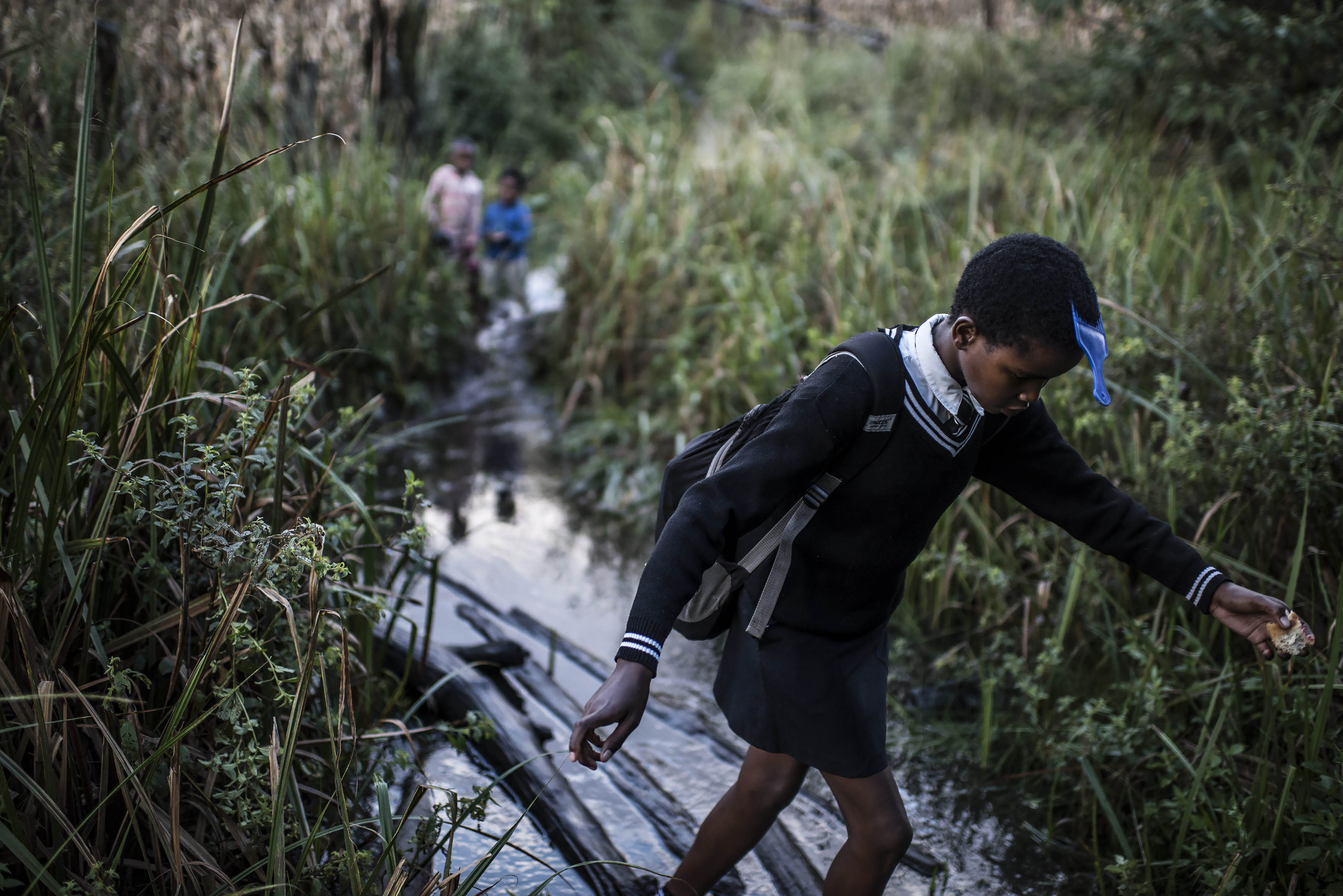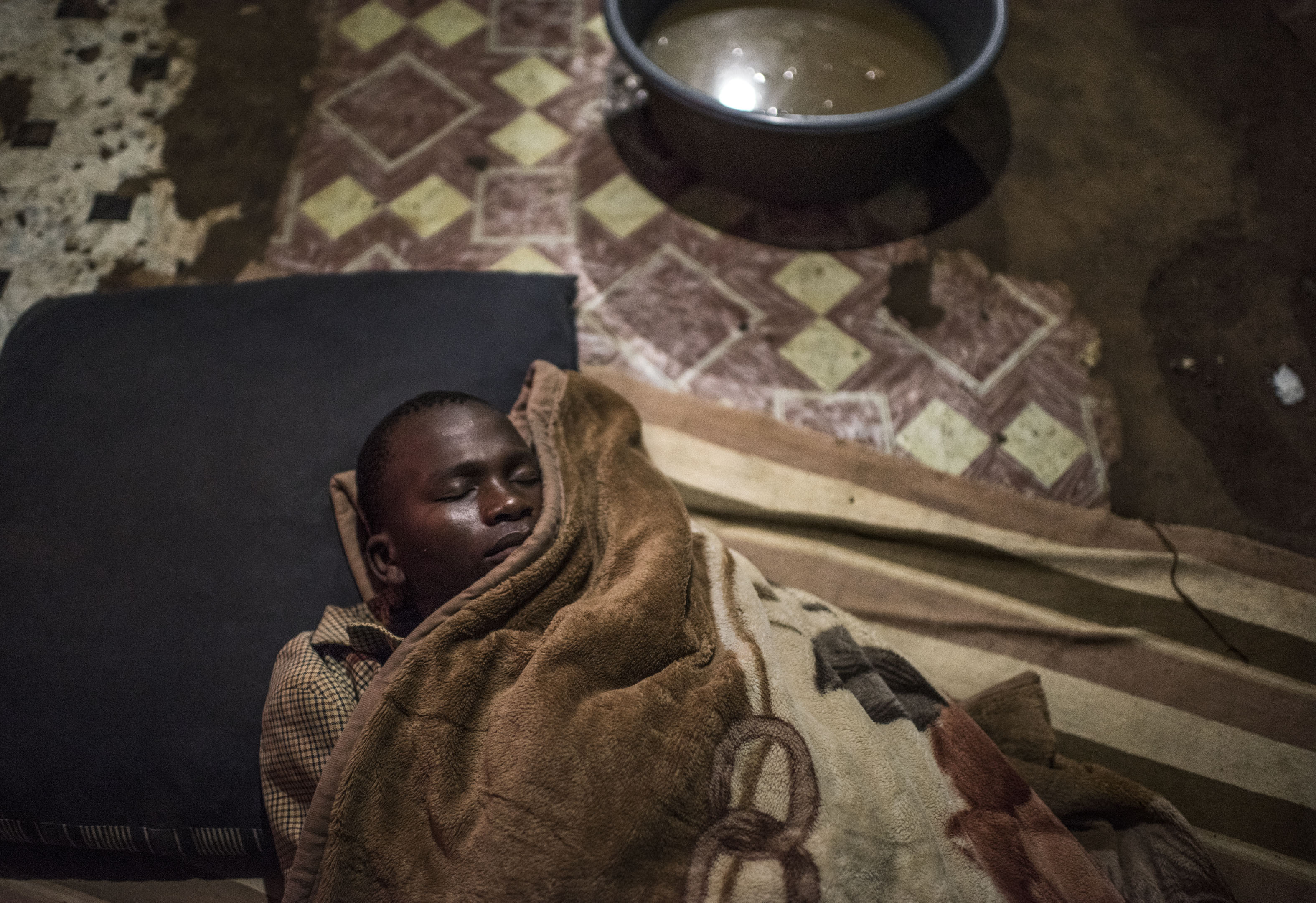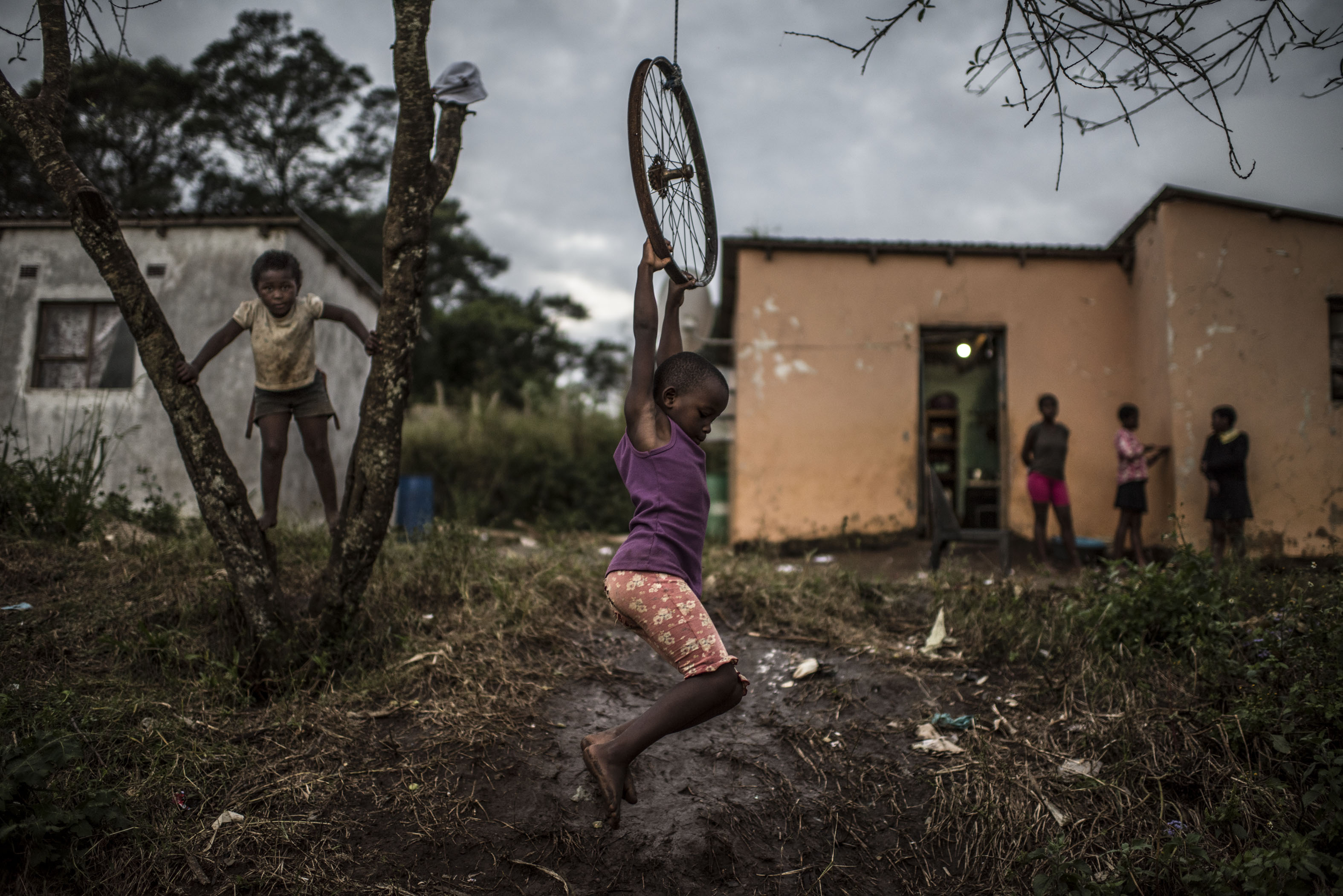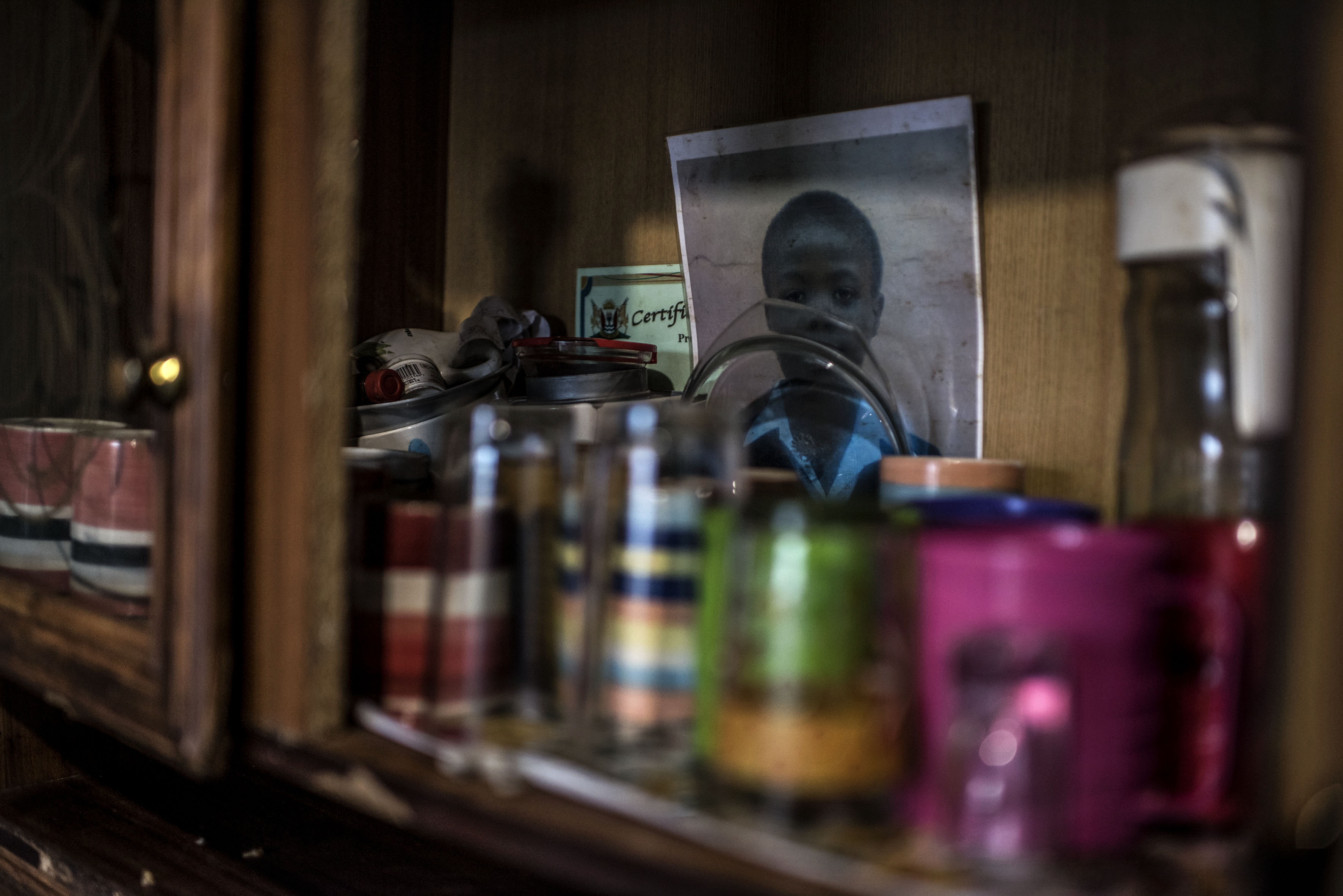Lenathi, Thimna and Nikita in one of two beds shared by the six children living in the older Mayixhale house. (Paul Botes/M&G)
The M&G returns to the Mayixhale household, in the Eastern Cape, for the fourth time since the 2004 elections. In that time, the family says it has given up on believing that change will come to the ANC stronghold
Lusikisiki — Weekday mornings in the Mayixhale household begin with a silent ritual.
Nikita, the eldest of the school-going children, gets ready to wash first. Her sister Nolona helps: fetching water from buckets in their small kitchen and heating it in the kettle, which is propped precariously on the family’s only, ageing, cabinet.
Nolona carefully shuffles between the buckets, the kettle, her sister’s washtub and the buckets again — making sure the water is the perfect temperature on the slowly thawing autumn morning.
The Mayixhale home in Goso, on the outskirts of Lusikisiki in the Eastern Cape, has changed little since the last time the Mail & Guardian visited the family in 2014, on the eve of the last national elections. Even the ornaments, with isiXhosa prayers scrawled on them, remain fixed to the wall.
In 2004, the M&G reported that the Eastern Cape had some of the poorest districts in the country. That is the reason the area was selected as one where reporters should head out to before the elections.
In the years since then little has changed: according to Statistics South Africa’s Poverty Trend report, released in 2017, the Eastern Cape remained the poorest province in 2016, with 12.7% of its households classified as multidimensionally poor (poor health, lack of education, inadequate living standards, disempowered and living in areas with poor quality of work, threats of violence, environmental risk, among others).
Now, as another national election looms, Lizeka — one of the breadwinners of the Mayixhale household — says she feels the politicians vying for her vote have abandoned her family.
The most striking difference in the landscape surrounding the Mayixhale’s faded pink home is the half-built, three-roomed house that now stands beside it. “We have tried to make things better with the new house,” Lizeka says, adding that she is not sure when they will be able to finish building. She has been putting money from her salary into its construction since 2016.
Until the new house is finished, the six children sleep in the old two-roomed house, where the smell of shoe polish hangs in the air. Lizeka hopes that the two houses will be like one big home.
Two of the children — Nolona and Yolanda — are her own. The other four are her older sister Zandile’s children.

Yolanda has to use unsteady logs to cross a muddy puddle in order to get to school. (Paul Botes/M&G)
When the M&G visited the family five years ago, nine people were living in the house, under the care of Zandile and Lizeka. The M&G was first introduced to the Mayixhale household in 2004 through Nonyaniso, Zandile and Lizeka’s older sister. Nonyaniso died of an HIV-related illness towards the end of that year.
For most of his presidency, Thabo Mbeki and his health minister refused to roll out a full-scale HIV treatment programme. A 2008 study by Harvard University estimated that more than 330 000 people died unnecessarily in South Africa as a result.
In 2010, the family’s matriarch, Bonani, died from tuberculosis, leaving Zandile and Lizeka in charge of the small household.
With little work near her home, Lizeka works and lives in nearby Lusikisiki. The hard-to-navigate gravel roads leading to their house means that Lusikisiki feels much further away than it is.
The almost R900 a month Lizeka would have to pay for transport to and from the retail store where she works is double the amount she pays for rent in town. The town’s one main road is filled with a throng of hooting taxis at 5pm and is empty by nightfall.
Because of this, Lizeka only visits the children on weekends. When she makes an unexpected appearance at the house, the younger children squeal with excitement. “They think I am coming with sweets,” she says.
Zandile has found work even further away, as a cleaner in Kokstad. The town is more than a two-hour drive from Lusikisiki, so she can only visit the children once a month. When she does so, she sleeps in one of the finished rooms in the new house.
Lizeka says she worries when she has to leave the children at home by themselves. But she is practical about the situation: “When I am in town, I can put a little bit, little bit away and buy food and electricity.”
Electricity costs R50 for five days. When the M&G first met the family, they had no electricity — a service which remained elusive for the family until the year after Bonani died.
In 2009, Zandile said: “In 2004 we voted, but today we have no electricity. They promised us, but there is still no electricity. They are lying just to get our votes.”
Today a gash remains in the wall where the electricity meter was first installed. Lizeka had to move it because water started seeping in through that wall.
Although she says she would prefer a government job to the one she has now, Lizeka says she is “so desperate for the work”.
“I am not staying [in Lusikisiki] because I like to work there. I am staying because of all the problems we have here at home … I need the job.”
Lusikisiki and its surrounding areas belong to the Ingquza Hill local municipality. The 2011 census said the unemployment rate in the municipality was 51.6%.
A more recent StatsSA labour
survey put the expanded unemployment rate in the Eastern Cape, for the last half of 2018, at 36% — the highest unemployment rate in the country.
While the two mothers are away, Thabang, Zandile’s oldest, “must be like the mommy”, as Lizeka puts it. The 18-year-old, who recently quit high school, snores softly as he sleeps on the floor of the living room-cum-kitchen area, next to a bucket catching rainwater dripping from the ceiling.

Thabang sleeps on the kitchen floor alongside a basin catching dripping water. (Paul Botes/M&G)
“He is tired,” Lizeka says when asked why Thabang decided to leave school after being told to repeat grade 10 a third time.
The younger children go through their morning routine around him.
Nolona tiptoes around Thabang with her containers of water. Later, when the sun has peeked over the green hills, half-grown chicks sneak into the house looking for crumbs on the floor. They walk over Thabang’s body, which is tightly wrapped in a blanket, and eventually leave when they fail to find any morsels of food to peck at.
The silence of the morning is punctuated only by muffled giggles, as the two youngest children, Thimna and Linathi, watch their sisters get ready.

Linathi and Thimna play outside the two houses. (Paul Botes/M&G)
Nikita and Nolona are the first to leave for school. They have to cross a marshy pool of water — made worse by the heavy rains the days before — using unsteady logs placed in the puddle for dry passage. Nolona wears a pair of flip-flops on the walk down so as not to scuff her freshly polished school shoes.
The pair part company at the bottom of the hill that leads up to the house. They cross a bridge, which traverses the river where the family gets their water.
Lizeka says the local municipality has laid pipes for water, but the taps run dry and “are just for decoration”. The Eastern Cape has the highest number of households reported to have no access to piped water, a 2016 community survey found.
The two girls want to finish matric and study further. Nikita says she wants to be a pilot, though she has never flown in a plane. Nolona wants to be a chartered accountant.
They won’t be the first in their family to finish high school. Lizeka was eventually able to get her matric certificate and Esihle, Nonyaniso’s daughter, is in East London studying.
Only 16% of Ingquza Hill residents had completed their matric in 2016, and only 2% obtained an undergraduate degree.
Missing from the school run is Sisonke, Nonyaniso’s youngest daughter. She was only 13 when she died in 2017, her own dreams for the future stopped in their tracks by an HIV-related illness.
Sisonke was just a baby when the M&G first visited the home in 2004. Like her ailing mother, she was left weak by the illness. But Sisonke received antiretrovirals immediately, and by 2009 she was a bouncy five-year-old, eager to help her grandmother with household chores.
Lizeka explains that Sisonke became ill when there was a delay in putting her on to a new antiretroviral treatment. Some people’s HIV becomes resistant to treatment and they have to go on second-line antiretroviral therapy.
Today a photograph of Sisonke in her school uniform is kept behind the glass window of the Mayixhale’s solitary cabinet, alongside the children’s certificates from school.

A photograph of the late Sisonke watches over the family. (Paul Botes/M&G)
Lizeka lists Sisonke’s death as one of the many blows the family has suffered over the years, grouping them together under what she calls “problems at home”.
She says she feels she cannot rely on the government for help. In the last national elections in 2014, the ANC won an overwhelming majority in Ingquza Hill, with 86% of the municipality’s residents casting their vote for the party. The ANC also won in Ingquza Hill in the 2016 municipal elections, winning 83% of the vote.
The party’s strength in the area is a reflection of its dominance in the Eastern Cape. In 2014, the party won 71% of the vote in the province. It took a 6% hit two years later during the municipal elections, as the Democratic Alliance gained ground in the province.
Standing in between the two beds that the children pile into at night, Lizeka says firmly that this year she is “not voting for anyone”.
“They take the votes, and then after the election, they don’t do anything. Even now, you can see that I am still suffering,” she says, her eyes downcast.
“No one can help us. When it is the time for politicians, they try to come to make us happy. They do this and that to make us vote. After that, they disappear.”
To read the stories from the M&G’s previous visits go to mg.co.za/tag/mayixhale-family